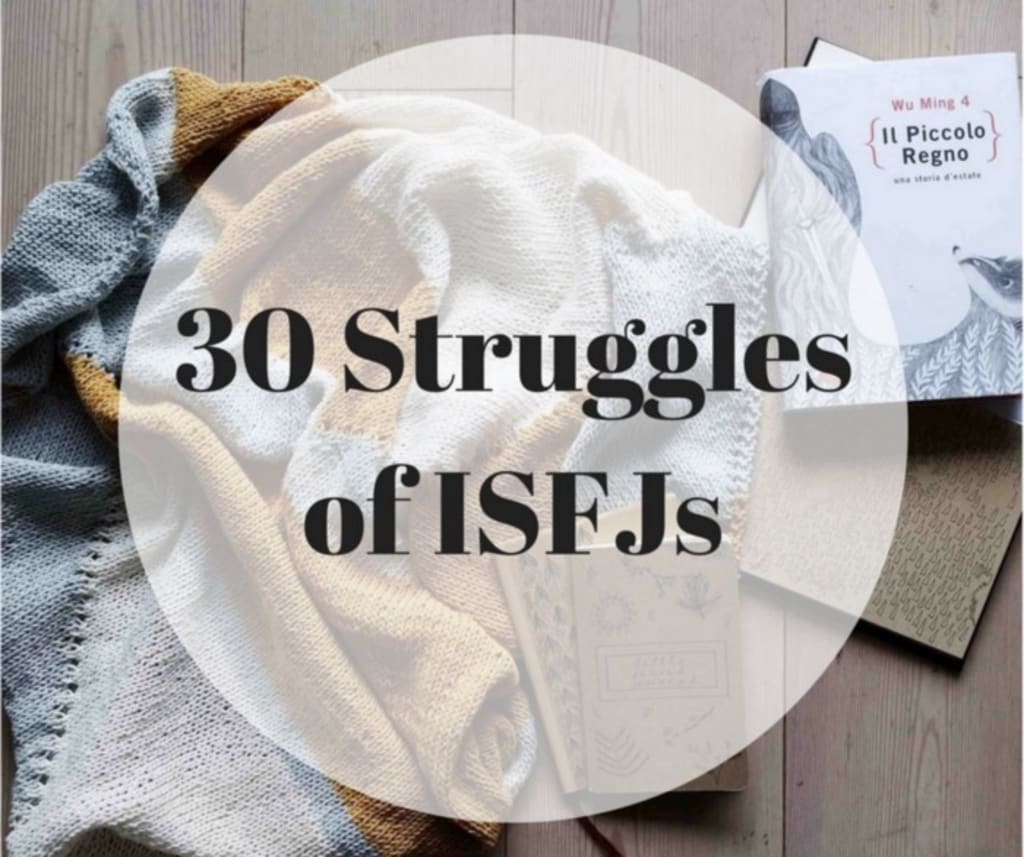30 Struggles of ISJFs
Learning More about the MBTI Personality

The wonderful ISFJ is the martyr of the Myers–Briggs personality test. It stands for introversion (I), sensing (S), feeling (F), and judgment (J). This type is influenced by introverted sensing and guided by extroverted feeling. People with this personality type either like you or couldn’t care less about you. When they do like you, however, they’ll move mountains to make you happy.
Expect warmth, diligence, and lots of baked goods from an ISFJ.
Here are 30 everyday struggles you may face as an ISFJ:
1. Getting mislabeled as an ISTJ and having people think you’re nitpicky about matters you don’t care for in the slightest.
2. Being a goofball while people think you’re serious or grumpy.
3. Feeling insecure and assuming the people around you are smarter, better, or more equipped than you.
4. Not caring about winning at board games. You just want to have fun, but everyone else is so serious.
5. Liking people and supporting them, but feeling unsure if they feel the same way.
6. Being paranoid about someone without fully knowing the situation.
7. Developing anxiety and being unable to shake off feelings of impending doom.
8. Appreciating clean aesthetics and being easily disturbed with anything out of sync.
9. Sometimes you come off rigid, inflexible, or cold because your introversion keeps you at a distance and your sensing prevents you from seeing certain needs.
10. You need a meteorologist to forecast your emotions. There always seems to be a storm coming.
11. Feeling threatened if your external world is attacked or changed, which can cause you to shut down.
12. Loathing spending time with people you don’t like.
13. Focusing so much on the people you love that you overlook your own needs. This can lead to sudden flares of emotion or extra-long naps.
14. Being so content with the familiar that it’s difficult to branch out into something new.
15. Feeling overwhelmed because there is too much conflict in a room.
16. Experiencing difficulty leaving a bad relationship because you don’t want to hurt the other person’s feelings.
17. Having a hard time moving on from a bad relationship because of lingering thoughts on what could have been different.
18. Feeling intense emotions that you don’t express because you don’t want to scare people away.
19. Needing to express your feelings daily rather than allowing them to build up. Holding it in would make you explode and end up saying things you didn’t mean.
20. Feeling attracted to ESFP and ESTP personalities, which can be naturally deceiving personalities if not matured correctly.
21. Being introverted, but not as introverted as other personality types. You’re like the INFJ in that they’re more social introverts, which can get confusing.
22. Craving stability so much it can be a crutch. Sometimes you could grow more by pushing yourself, but you tend to avoid it because it makes you feel anxious.
23. Holding a grudge for a long time.
24. Struggling to release sadness in front of others, making it difficult for your loved ones to really know you.
25. Refusing to talk about some of your favorite interests because you’re unsure if you’ll fit in with other people. You may be quiet about sharing your favorite authors, movies, and toys because you prefer hearing what makes other people happy.
26. Covering up emotional pains through exercise.
27. Experiencing sudden bouts of insecurity in relationships because of past events.
28. Continuing to do the same thing over and over again, only to fail because you can’t see the bigger picture of what you’re doing wrong.
29. Coming off as secretive even though that was never your intention.
30. Spending extra hours cleaning up after others and being hesitant to bring it up because it may hurt other people’s feelings.
What Are Traits of the ISFJ Personality Type?
Introverts with a preference for sensing tend to know how their body feels, which makes them excel at meditation, cooking, physical work, dancing, and athletics. Sensing helps them determine what energy they need and what drains them. They can, however, get addicted to coffee, alcohol, or even physical activity. Why? Because those things are good shortcuts.
The ISFJ is prone to putting themselves down because they have a feeling-oriented personality that is among the most warm-hearted personalities in the Myers–Briggs world. The ISFJ enjoys showing hospitality and may do so by sprucing up a place with flowers, scented soap, classical music, or comfy furniture. They will want to cook for you, have your bed ready, and provide extra shampoo if you stay over at their home.
The ISFJ can be compared to an ESFJ if its extroversion was sucked out by a vampire. It can also feel like an INFJ until you face it with too many random, abstract ideas. The ISFJ does well with SJ personalities and NF personalities. If people get too serious for the ISFJ, it may turn them off.
Someone with the ISFJ personality has a lot of people-oriented goals. They may desire a career or creative-oriented pursuit, but traditionally an ISFJ wants to find a perfect soul mate and raise a number of sharp, wonderful children. They are inclined to be a great spouse and parent because of their nurturing personality. A happy ISFJ is one that is nurtured and pampered and ensures others are as well. They want their family to feel happy and safe.
Above all, ISFJ personalities are kind, considerate, and lovers at heart. They are hard-working, eager to please, and stick to healthy routines. They’re great listeners with beautiful hearts. Having an ISFJ in your life can make you feel encouraged and ready to take on the world. They are committed and nurturing souls, often withholding judgment and showing mercy instead. They make great parents, friends, and spouses. They set an amazing example for all of us to follow.
*** *** ***
Originally published: https://owlcation.com/social-sciences/30-Struggles-of-the-ISFJ
About the Creator
Andrea Lawrence
Freelance writer. Undergrad in Digital Film and Mass Media. Master's in English Creative Writing. Spent six years working as a journalist. Owns one dog and two cats.






Comments
There are no comments for this story
Be the first to respond and start the conversation.